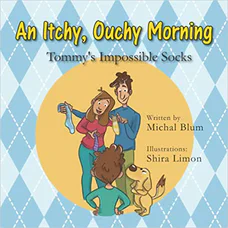An Itchy, Ouchy Morning
Tommy’s Impossible Socks

Recommended Age Range: Preschool through 2nd grade.
Publisher's Summary:
Little Tommy has a hard time getting ready for school because his socks are so annoying! Mom, Dad, and ‘Shoe,’ their dog, are trying to help him, suggesting all kinds of funny ideas, including going to see Doctor McSocky, who lives in Socksville, or inventing a one-of-a-kind perfect sock. Eventually, Tommy finds motivation and gains the sense of control needed to overcome this challenge with the help of his parents’ patience and acceptance.

Dr. Annie's Takeaways
Recommended for: This silly book written in rhyme empathizes with kids whose feet feel uncomfortable in socks, and it gently pokes fun of the great lengths parents will go to in order to find socks their child will wear. In the end, Tommy eschews these accommodations, picks out a pair of socks on his own, and tolerates the discomfort because he wants to get to school to play with his friends. It’s a great way to start a conversation about strategies for tolerating discomfort when sensory accommodations aren’t possible or don’t seem to be helping.
Would a child like it? It’s a funny book that isn’t at all shaming to kids with sensitive feet. In fact, the parents look sillier than anyone else in the book. It ends on an empowering note and is written in a fun, rhyming verse.
Tone: Silly, upbeat
Story Quality: This rhyming story will be immediately relatable to anyone whose morning has ever been ruined by itchy, ouchy socks. It’s funny, and the story is kind to the sock-hating protagonist. The verses mostly flow well, with a clunky line here and there.
Illustrations: Vibrant, cartoony illustrations on white backgrounds.
Representation: Tommy is a White boy with a White father and mother, and a dog named Sock. Tommy has very sensitive feet and struggles to feel comfortable in socks.
Psychological Practices: This book shows how accommodation of sensory preferences does not always work, and it champions tolerating a sensory challenge through motivation and determination. Tommy’s parents try their very best to accommodate Tommy’s sensory preferences–they offer socks of every material, inside-out socks, toe socks, and seamless socks, but nothing is comfortable to Tommy’s feet. When this doesn’t work, they start to dream up bigger interventions–going to a “sock doctor” and building a factory to make the perfect sock. By the end of the book, Tommy declares these ideas to be “weird” and too time-intensive. He wants to get to school on time, and he’s looking forward to seeing his friends. He “bravely decides this pair will do. He clenches his jaw and wears the socks on his feet, thinking happy thoughts about the friends he’ll meet.” He reminds himself of what he’s looking forward to playing with his best friend Pete, and this helps him to put on both of his socks and get ready for school.
Concerns: Tommy’s coping strategy of thinking about his motivation for tolerating the uncomfortable sensation (i.e., getting to school on time so that he doesn’t miss playtime) is a useful one. He doesn’t seem to have any others; clenching his jaw will likely make him feel more rather less stressed. He would probably benefit from some other types of self-soothing skills like deep breaths and positive self-talk, and I would talk about these with a child who has similar itchy-ouchy mornings.
Buy This Book:
Amazon
